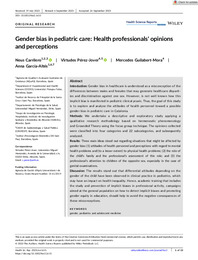Please use this identifier to cite or link to this item:
https://hdl.handle.net/11000/35031Full metadata record
| DC Field | Value | Language |
|---|---|---|
| dc.contributor.author | Carrilero, Neus | - |
| dc.contributor.author | Pérez-Jover, Virtudes | - |
| dc.contributor.author | Guilabert Mora, Mercedes | - |
| dc.contributor.author | García-Altés, Anna | - |
| dc.contributor.other | Departamentos de la UMH::Psicología de la Salud | es_ES |
| dc.date.accessioned | 2025-01-20T12:45:23Z | - |
| dc.date.available | 2025-01-20T12:45:23Z | - |
| dc.date.created | 2023-09 | - |
| dc.identifier.citation | Health Sci. Rep. 2023;6 | es_ES |
| dc.identifier.issn | 2398-8835 | - |
| dc.identifier.uri | https://hdl.handle.net/11000/35031 | - |
| dc.description.abstract | Introduction: Gender bias in healthcare is understood as a misconception of the differences between males and females that may generate healthcare disparities and discrimination against one sex. However, is not well known how this implicit bias is manifested in pediatric clinical praxis. Thus, the goal of this study is to explore and analyse the attitudes of health personnel toward a possible gender bias in pediatric care in Catalonia. Methods: We undertake a descriptive and exploratory study applying a qualitative research methodology based on hermeneutic phenomenology and Grounded Theory using the focus group technique. The opinions collected were classified into four categories and 22 subcategories, and subsequently analyzed. Results: Three main ideas stood out regarding situations that might be affected by gender bias: (1) attitudes of health personnel and perceptions with regard to mental health problems and (to a lesser extent) to physical health problems; (2) the role of the child's family and the professional's assessment of this role; and (3) the professional's attention to children of the opposite sex, especially in the case of genital examinations. Discussion: The results stand out that differential attitudes depending on the gender of the child have been observed in clinical practice in pediatrics, which may have an impact on health inequality. Hence, academic training that includes the study and prevention of implicit biases in professional activity, campaigns aimed at the general population on how to detect implicit biases and promoting gender equity in education, should help to avoid the negative consequences of these misconceptions | es_ES |
| dc.format | application/pdf | es_ES |
| dc.format.extent | 13 | es_ES |
| dc.language.iso | eng | es_ES |
| dc.publisher | Wiley | es_ES |
| dc.rights | info:eu-repo/semantics/openAccess | es_ES |
| dc.rights | Attribution-NonCommercial-NoDerivatives 4.0 Internacional | * |
| dc.rights.uri | http://creativecommons.org/licenses/by-nc-nd/4.0/ | * |
| dc.subject | gender | es_ES |
| dc.subject | pediatrics and adolescent medicine | es_ES |
| dc.subject.other | CDU::1 - Filosofía y psicología::159.9 - Psicología | es_ES |
| dc.title | Gender bias in pediatric care: Health professionals' opinions and perceptions | es_ES |
| dc.type | info:eu-repo/semantics/article | es_ES |
| dc.relation.publisherversion | https://doi.org/10.1002/hsr2.1615 | es_ES |

View/Open:
7.Health Science Reports - 2023 - Carrilero - Gender bias in pediatric care Health professionals opinions and perceptions (1).pdf
433,05 kB
Adobe PDF
Share:
.png)
